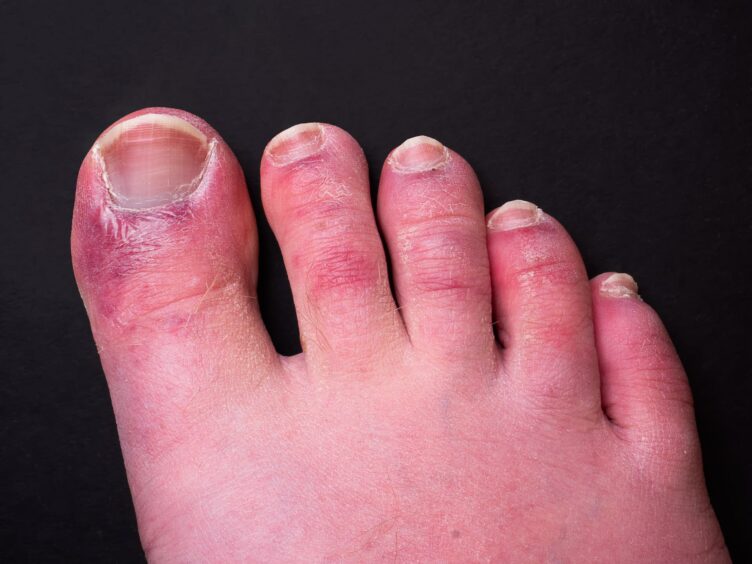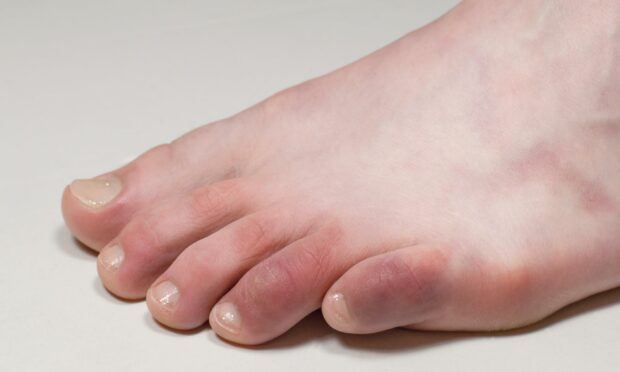Most of us are familiar with the typical coronavirus symptoms – either from learning about them over the last two years, or from actually having the virus.
Common symptoms range from a fever and new or continuous cough, to a sore head or throat.
And this week, the official list of Covid-19 symptoms was expanded to include nine new signs of the virus.
But there are some more unusual symptoms experienced by some infected with the virus.
From Covid toe to food tasting like petrol, we’re bringing you some of the most unusual signs of the virus.
1. Covid toe
It sounds strange, but Covid toe a very real side effect of coronavirus.
Covid toe is where one or more toes swell and turn pink, red, or a purplish colour. Alongside the discolouration, others may experience blisters, itching and pain.
The condition mostly affects children, teenagers and young adults, but can be experienced by older people too.

It is simply thought to be a side effect of the body switching into attack mode to fight off the virus.
It is thought to occur when a certain antibody mistakenly attacks your own cells, not just the virus.
2. Hearing loss
Research from February 2021 on the link between Covid-19 and hearing problems estimated that following infection with the virus:
- 7.6% of people report hearing loss
- 14.8% report tinnitus
- 7.2% report vertigo
It is more common to develop gradual hearing loss in the days to weeks after having the virus, as opposed to when initial symptoms begin.

It is not entirely known how or why Covid can cause hearing loss. Some medications used to treat Covid list hearing loss as a side effect.
If at any point during infection you experience sudden hearing loss, you should seek medical advice immediately, by calling NHS 24 on 111.
3. Speech and voice problems
While it’s not a common side effect, some people experience changes to their voice after having Covid.
According to the NHS, this can include changes to the way your voice sounds, or to comfort and effort levels when speaking.
The NHS says: “These changes are similar to the changes you would expect to experience with a cold or flu, but are expected to be more intense and longer lasting.

“We anticipate that these voice problems may take six to eight weeks to gradually resolve.”
These changes are thought to be caused by long periods of coughing induced by the virus, which can make the vocal cords swollen and inflamed.
Staying hydrated and sucking sweets can help speed up your recovery.
4. Hair loss
When your body is fighting an infection, temporary hair shedding can be one of the side effects.
This shedding typically occurs around two to three months after having Covid and usually resolves itself after a few months.

About 90% of hairs on our scalp are in a growth phase, called anagen, and about 10% are in the telogen phase – where they come to the end of their life cycle and shed.
But, according to researchers from the University of Utah: “When an individual experiences a stressful event, such as Covid-19 infection, our bodies can prematurely shift a greater than normal proportion of growing hairs into telogen state.”
This explains why you may be experiencing hair loss after Covid, and why you shouldn’t be alarmed.
5. Period changes
We’ve written previously on how Covid vaccines have impacted people’s menstrual cycles, but did you know having the virus could also affect it?
Some report irregular periods, unusual clotting of their period blood, or worsened premenstrual syndrome (PMS).

Others who haven’t had their period in a long time due to birth control report it returning unexpectedly either during or soon after infection.
6. Changes to taste or smell
You’ve probably heard of people losing their senses of taste or smell after having Covid.
But, did you know Covid can also cause changes to taste and smell, making your favourite foods taste completely different?

People have spoken out about food tasting of paint or petrol, or coffee smelling like cleaning products or burnt ashes, making it undrinkable.
While this was a more common symptom of previous Covid strains, according to Norwegian research, it still can occur if you’re infected with Omicron.
7. Brain fog
After having Covid, you might find yourself feeling more confused or forgetful than normal.
“Brain fog” describes a range of symptoms including:
- Poor concentration
- Confusion
- Thinking more slowly than usual
- Forgetfulness
- Lost words
- Mental fatigue
This symptom may be due to the body’s immune response, or inflammation throughout the nervous system and blood vessels that lead to the brain.

People usually recover from brain fog. You may experience similar symptoms after other infections, minor head injuries or during the menopause.
To manage brain fog symptoms, the NHS advises you get enough sleep and exercise, meditate, take regular breaks and do things you enjoy, such as socialising or hobbies.
- If you’ve experienced any strange or uncommon Covid symptoms, let us know by emailing healthandwellbeing@thecourier.co.uk
